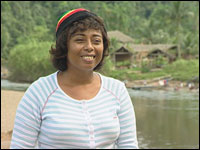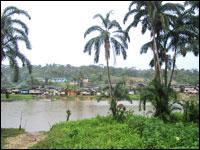The Pacific Coast of Colombia, a narrow slice of jungle between the Andes and the ocean, is rich with plant and animal life. It’s also home to about a third of Colombia’s 10.6 million Afro-Colombians, descendants of black slaves emancipated in the mid-1800s. In recent years, this isolated area has been hit hard by logging, gold mining, industrial agriculture, and Colombia’s civil war.

Grueso.
Photo: David Lent.
Social worker Libia Grueso, a native of the Pacific Coast, is a cofounder of the Process of Black Communities (PCN), a civil-rights group that advocates for Afro-Colombians. In the early 1990s, she and her allies helped pass “Law 70,” which granted legal recognition and territorial rights to Afro-Colombians. They’ve used this national law to battle shrimp-farm projects and other industrial development along the coast. Grueso, 43, has also spoken out against the environmental damage caused by the civil war and U.S. military aid.
This is dangerous work. Since 1998, some 75 Afro-Colombian leaders have been assassinated on the Pacific Coast, and many others have been persecuted for their environmental and civil-rights work. But Grueso’s voice still rises with excitement when she talks about the natural and cultural diversity of her home region.
On April 19 in San Francisco, Calif., Grueso was awarded one of six 2004 Goldman Environmental Prizes. She plans to use part of the money for a PCN branch office and the rest to pay for her children’s education. She spoke to Grist through a translator.
Please tell me a little bit about the nature and people of Colombia’s Pacific Coast region.
It’s one of the five richest biological areas in the world — it has 10.6 percent of the bird species in the world. The biological diversity is threatened by extractive industries, by the timber and gold industries and by all the mega-projects being planned in the area. It is also threatened by the expansion of monocultures: the palm industry and the monoculture of cocaine. Both of them are threatening the natural conditions in the area, and they are also threatening traditional cultural practices. The community in this zone is 93.4 percent Afro-Colombian, and they have maintained practices associated with the jungle. The jungle makes our lifestyle, and our natural vision, possible. The most important thing is that the [Afro-Colombian] community has a different lifestyle, a different kind of relationship with nature, a different sense of life and death. That is what we have to offer the rest of the world.
How has the civil war in Colombia worsened those problems?
First of all, it should be said that armed conflict exists in this area because of a dispute over who owns the land. The area where armed conflict can be found coincides with areas where major projects are being proposed. War in this region is clearly about territory, about the land we have conserved for more than 400 years. It’s resulted in the movement of people within our region — of the 3 million people displaced [by the ongoing conflict in Colombia], 2 million are Afro-Colombian. It’s caused our leaders to be threatened, and some have even been assassinated.
How did you decide to become an advocate for the region?
It’s a long personal story, but many like myself are conscious that if we don’t assume the defense of our culture, the defense of our territory, the defense of nature and our environment, not only will the culture disappear but also the nature associated with that culture. I’ve had a variety of experiences that have made me conscious of the importance of our region, and how it is threatened by so-called development.
I understand you helped pass Colombia’s Law 70 in 1993. What was the importance of this legislation?
It was very, very important. It recognized the right to land, to territory, of the people who have been there for more than 400 years. It made it possible to show the importance of culture and of different and distinct parts of society — we were able to show them to the dominant parts of the country. It led to the development of a dialogue between Afro-Colombian people and the state.
What do you consider your greatest victory so far?
First, that the Afro-Colombian community recognizes itself as an important player, and has dignity. That we’ve been able to relate to the other social movements of Colombia, that there’s been an intercultural dialogue and a recognition and appreciation of differences — a recognition of diversity. One can see very clearly, in the jungle itself, that there is a diversity of ways of life. Our vision is that we can construct a different model of development.

The Yurumangui River in Colombia’s Pacific Coast region.
Photo: PCN/Solstice Foundation.
How has the U.S.-backed Plan Colombia affected the Pacific Coast?
It really has affected the whole country, in particular the Pacific. For example, in the Pacific practices such as fumigation have begun. Recently a measure was approved to fumigate in national parks — that is completely anti-nature. In this vehement effort to eradicate illicit agriculture, one can obviously eliminate other plant life. There’s been a lot of investment in military products, millions of dollars spent sending personnel and airplanes that poison the forest and water, and no support for people or conservation efforts. We’re not in any way opposing the help [from the United States] but how that help is being invested.
What does this prize mean to you?
It’s an opportunity to exchange experiences, to reaffirm ourselves in solidarity with those who are struggling to change what development means. It’s an opportunity to share the importance of the Pacific Coast jungle and its traditional cultures.
I understand that some of your allies have been persecuted and even killed for their work. What’s given you the courage to continue?
We are many people, and we know that this effort is worthwhile not only for ourselves but also for the whole world. If some of us have to die, that means that some of us have to continue — and in that persistence one finds the strength for the struggle. Our slogan is that our territory is filled with life, happiness, and liberty, and we make every effort in every instance to be happy, despite the things that occur.


